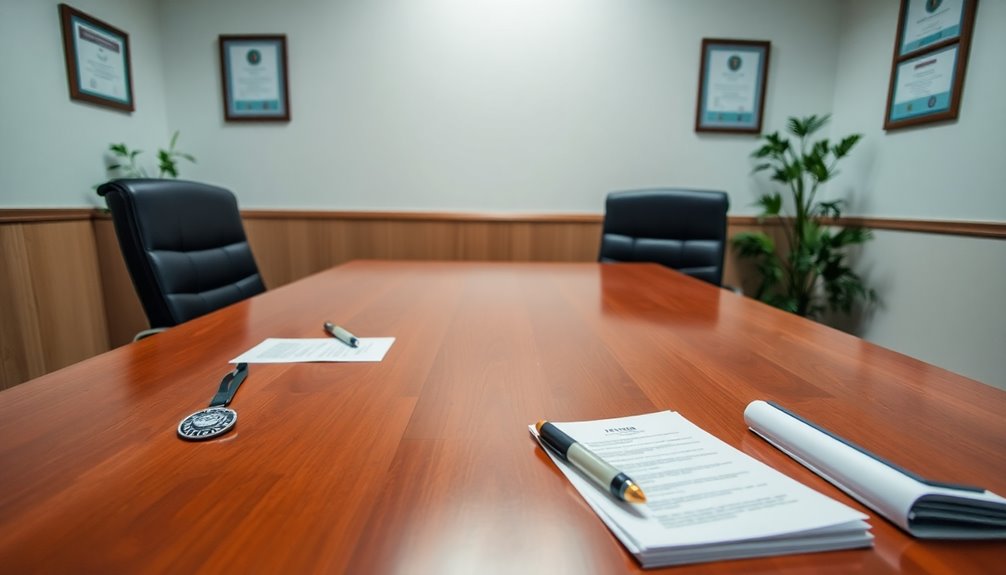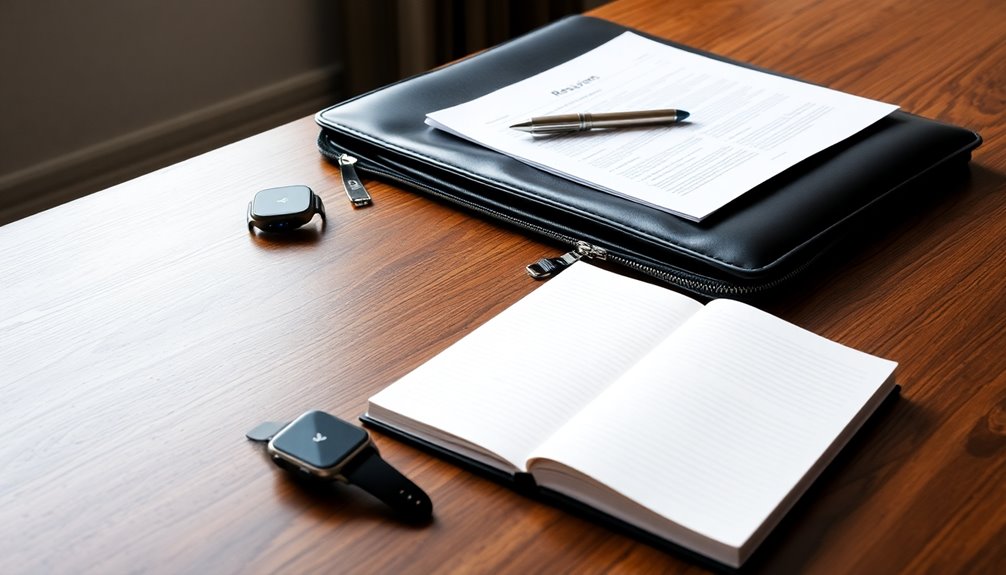When preparing for a security guard interview, you should focus on several essential questions. Expect to discuss your security experience, including specific responsibilities and achievements. Be ready for situational response scenarios, such as handling theft or unauthorized access. Questions about emergency management and your knowledge of life-saving procedures will likely arise. Don't forget to highlight your technology skills and understanding of security systems. Team collaboration questions will assess how you operate within a group. Finally, be prepared to discuss ethical considerations and conflict resolution strategies. If you want to explore more targeted questions, keep going for additional insights.
Key Takeaways
- Describe your experience with various security systems and how they relate to the specific needs of our organization.
- Share a concrete example of a time you successfully handled an emergency situation or security breach.
- Explain your approach to conflict resolution and how you maintain team dynamics during disputes.
- Discuss your familiarity with modern surveillance technology and your adaptability to new security tools.
- What procedures do you follow in case of unauthorized access or potential theft?
Importance of Interview Preparation
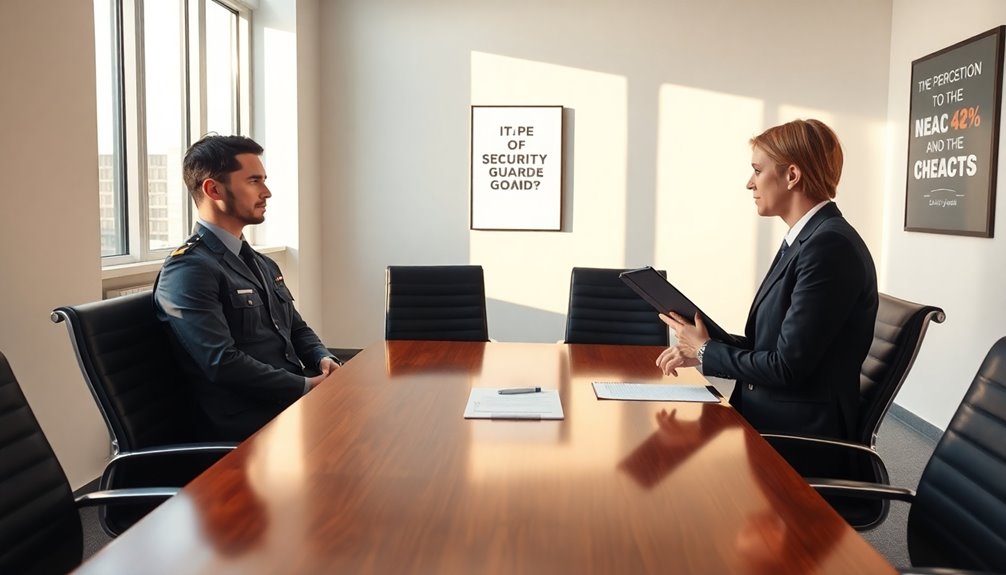
In the fast-paced world of security, being well-prepared for an interview can make all the difference in landing the job. You need to showcase your relevant background and skills effectively.
Start by researching the company and its specific security needs, allowing you to tailor your responses. Prepare answers for common interview questions and practice them until you feel confident. Remember to dress appropriately, as this conveys professionalism.
During the interview, maintain eye contact to demonstrate engagement and use clear, concise communication. Craft your responses to highlight your strengths and experiences, and don't forget to prepare a list of thoughtful questions for your interviewer.
This preparation not only boosts your confidence but also helps you make a lasting impression.
Key Security Experience Questions

Preparing for an interview involves not just understanding the company and crafting responses but also reflecting on your security experience.
You'll want to highlight the industries you've worked in and the specific responsibilities you've held in previous security roles. Think about your greatest strengths and weaknesses within the context of security.
Be ready to discuss your familiarity with various security systems and protocols, as well as any past achievements that demonstrate your effectiveness.
It's essential to provide concrete examples that showcase your skills and how they've contributed to maintaining safety and security.
Tailoring your answers to align with the job description can make a significant impact, so guarantee your experience resonates with what the employer is looking for.
Situational Response Scenarios

While maneuvering the complexities of security roles, it's crucial to be ready for various situational response scenarios. You might face theft, unauthorized access, or altercations among individuals.
When asked about these situations in an interview, focus on your thought process and actions. Describe how you'd assess the situation, prioritize safety, and communicate effectively with involved parties.
For instance, if someone attempts unauthorized entry, explain your immediate steps: alerting authorities, securing the area, and following protocol.
Highlight your ability to remain calm under pressure and make quick, informed decisions. Additionally, understanding the principles of ethical hacking can enhance your ability to identify potential security vulnerabilities in your environment.
Emergency Management Queries
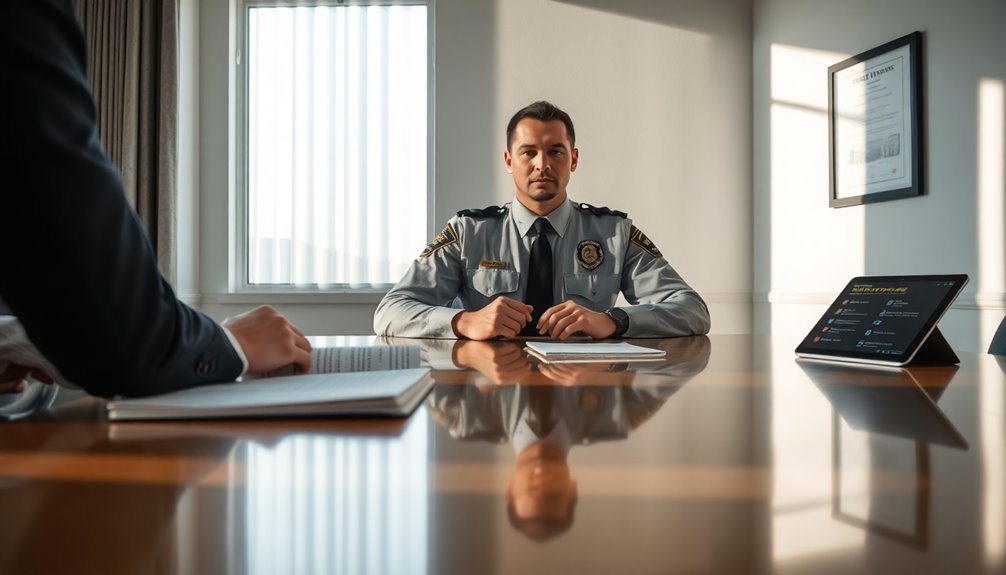
Effective emergency management is essential for security personnel, as it directly impacts safety and response outcomes. During interviews, you'll face questions that assess your readiness for emergencies. Be prepared to discuss your knowledge of life-saving procedures and crisis response protocols. Additionally, understanding the connection between UTIs and hallucinations can be critical in identifying potential issues in emergency situations.
| Question | Purpose |
|---|---|
| How do you prioritize emergencies? | To gauge your decision-making skills |
| Describe a time you managed a crisis. | To assess your practical experience |
| What training do you have in first aid? | To evaluate your preparedness for medical emergencies |
| How do you collaborate with law enforcement? | To understand your teamwork approach |
Your responses can demonstrate your competence and commitment to maintaining safety in potentially life-threatening situations.
Customer Service Focus

In the domain of security, providing excellent customer service is just as crucial as maintaining safety. You'll often be the first point of contact for guests and employees, so your approach can greatly impact their experience.
Always greet individuals warmly and be ready to assist them with inquiries or directions. Effective communication is key; listen actively to concerns and respond with clarity.
When faced with difficult visitors, remain calm and professional, using de-escalation techniques to manage the situation. Balancing security measures with a welcoming demeanor guarantees a safe yet friendly environment.
Crowd Control Inquiry
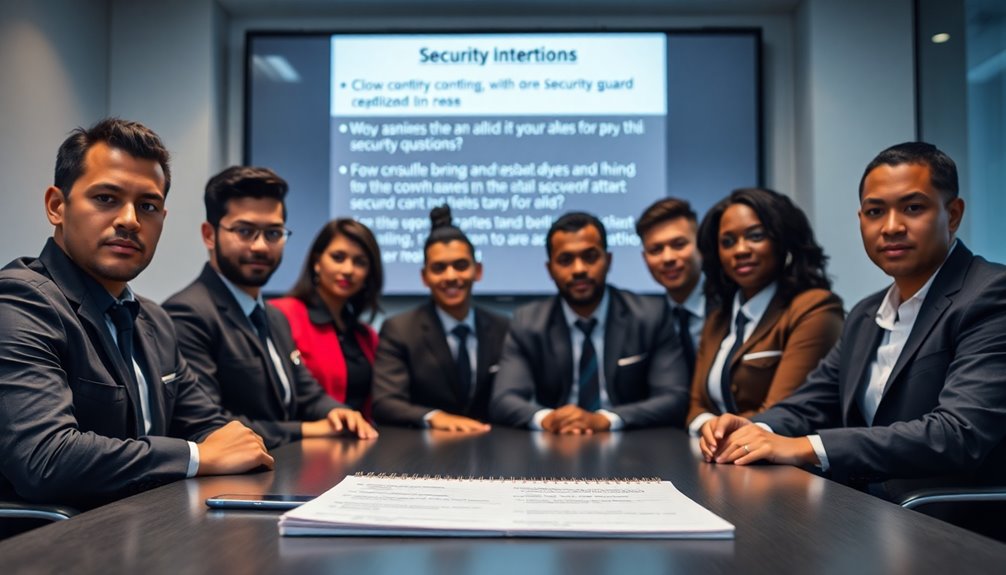
Managing crowds requires a keen understanding of dynamics and a proactive approach to guarantee safety for everyone involved.
During your interview, expect questions that gauge your ability to handle large groups effectively. You might be asked how you'd communicate with attendees during an event or manage disruptive behavior.
Consider sharing specific techniques you've used in the past, like establishing clear boundaries or using non-verbal signals to guide the crowd. Demonstrating your ability to collaborate with team members in high-pressure situations can also be essential.
Be prepared to discuss how you assess crowd behavior and adapt your strategies accordingly. Your responses should reflect your experience and readiness to maintain order while ensuring the safety of all individuals present.
Professional Development Questions
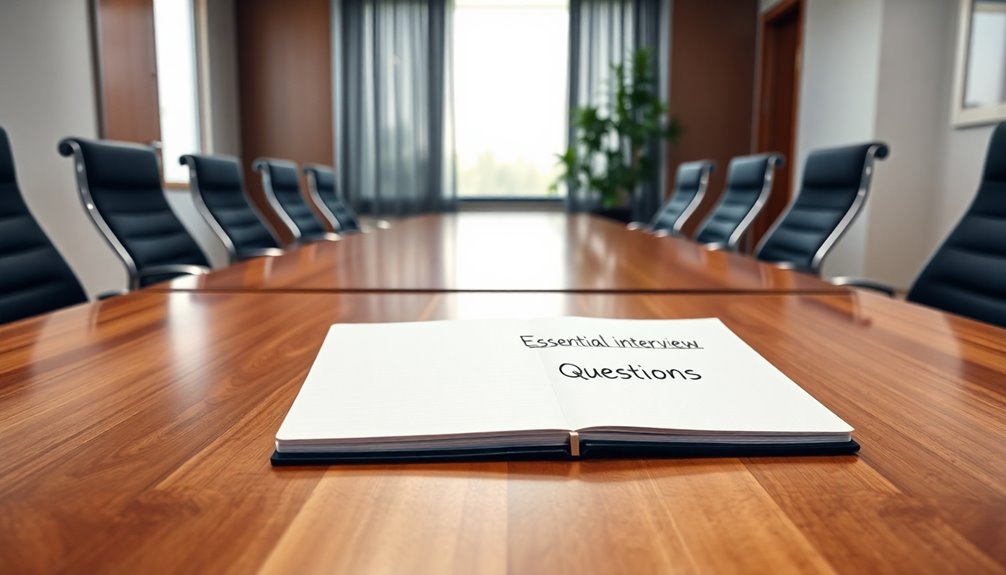
How can ongoing professional development enhance your security career? It keeps you updated on the latest security protocols and technologies, making you a more valuable asset to your employer.
During the interview, expect questions about your commitment to continuous learning. You might be asked how you've pursued certifications in areas like CPR or specialized security training.
Sharing experiences about attending workshops or conferences can demonstrate your proactive approach to professional growth. Highlight any criminal justice courses you've completed, as they provide a solid foundation for your role.
Discuss networking opportunities you've embraced within the industry, showing your dedication to connecting with peers and learning from their experiences.
This focus on development not only boosts your skills but also enhances your career prospects.
Ethical Considerations
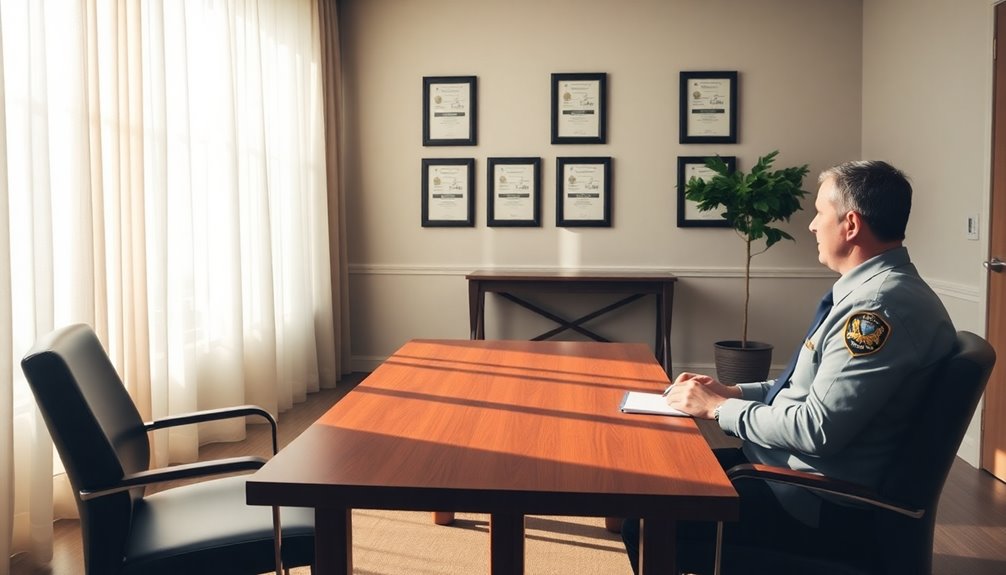
As you advance in your security career, understanding ethical considerations becomes vital. You'll need to be aware of your legal responsibilities and the importance of following company policies.
Ethical dilemmas can arise, and making the right decisions can impact your reputation and the trust the community places in you. Transparency and accountability should guide your actions; always be prepared to explain your decisions.
Building trust within the community you serve is essential; people need to know they can rely on you for safety and protection.
Technology Proficiency

While you may have strong interpersonal skills in security, technology proficiency is equally essential in today's landscape. Familiarity with modern security systems, surveillance technology, and data management can vastly improve your effectiveness.
Employers will likely ask about your experience with security software and hardware, so be prepared to discuss specific tools you've used. Highlight your ability to adapt to new technologies and your commitment to staying updated on advancements in the field.
Demonstrating a solid understanding of how technology enhances security operations can set you apart from other candidates. Ultimately, showcasing your tech-savvy nature not only reflects your readiness for the role but also conveys your enthusiasm to contribute positively to the organization's security framework.
Team Collaboration Dynamics

Collaboration plays an essential role in security operations, especially when technology integration requires teamwork. You'll need to communicate effectively with your colleagues to guarantee everyone's on the same page. Here's a quick overview of key aspects to reflect on during interviews:
| Key Aspect | Importance | Example Scenario |
|---|---|---|
| Clear Communication | Reduces misunderstandings | Sharing intel during a shift change |
| Role Definition | Enhances accountability | Knowing who handles specific tasks |
| Conflict Resolution | Maintains team harmony | Addressing disputes calmly |
Fostering strong relationships with your team not only guarantees operational efficiency but also contributes to a safer environment. Make certain to highlight your teamwork experiences during your interview to demonstrate how you can contribute to the team dynamic.
Frequently Asked Questions
What Motivates You to Work in the Security Industry?
You're motivated by the opportunity to protect people and property.
You find fulfillment in creating a safe environment and addressing potential threats before they escalate. Your passion for helping others drives you to respond effectively in emergencies, ensuring everyone feels secure.
You appreciate the challenges the security industry presents, as each day offers new situations that test your skills.
Ultimately, it's the sense of purpose and responsibility that fuels your commitment to this career.
How Do You Handle Work-Related Stress?
When you encounter work-related stress, it's essential to stay calm and focused. You can practice deep breathing techniques to regain clarity and reduce anxiety.
Prioritizing your tasks helps you manage your workload effectively. Taking short breaks allows your mind to recharge.
Additionally, discussing challenges with colleagues fosters support and teamwork. By maintaining a positive attitude and using stress management techniques, you'll navigate tough situations more smoothly and keep your performance on track.
Describe a Time You Learned From a Mistake
You're in the middle of a hectic shift when an oversight leads to a security breach.
The adrenaline spikes as you realize the mistake. Reflecting later, you learn the importance of double-checking protocols.
This experience taught you to stay vigilant and communicate better with your team.
Now, you approach each situation with a heightened sense of awareness, ensuring that past errors fuel your growth and enhance overall security effectiveness.
What Are Your Long-Term Career Goals in Security?
When considering your long-term career goals in security, think about where you see yourself in five to ten years.
You might aim for a leadership position, like a security manager, or specialize in areas like cybersecurity.
Focus on gaining relevant certifications and experience that align with those aspirations.
Networking within the industry can help you find opportunities, and staying updated on trends guarantees you're prepared for the evolving security landscape.
How Do You Prioritize Tasks During a Shift?
When you prioritize tasks during a shift, start by evaluating any immediate threats or emergencies that need your attention.
Next, address routine checks and monitor high-traffic areas. You should also consider any scheduled patrols or reports due.
Communicate with your team to guarantee everyone's aligned on priorities.
Finally, remain flexible; situations can change quickly, and you need to adapt your focus as necessary to maintain safety and security.
Conclusion
In summary, being well-prepared for your security guard interview is vital for showcasing your skills and experience. By anticipating key questions and practicing your responses, you can demonstrate your ability to handle various situations effectively. Remember, your potential employer wants to see how you can contribute to their team's safety and success. So, are you ready to make a lasting impression and secure the job you desire? You've got this!
